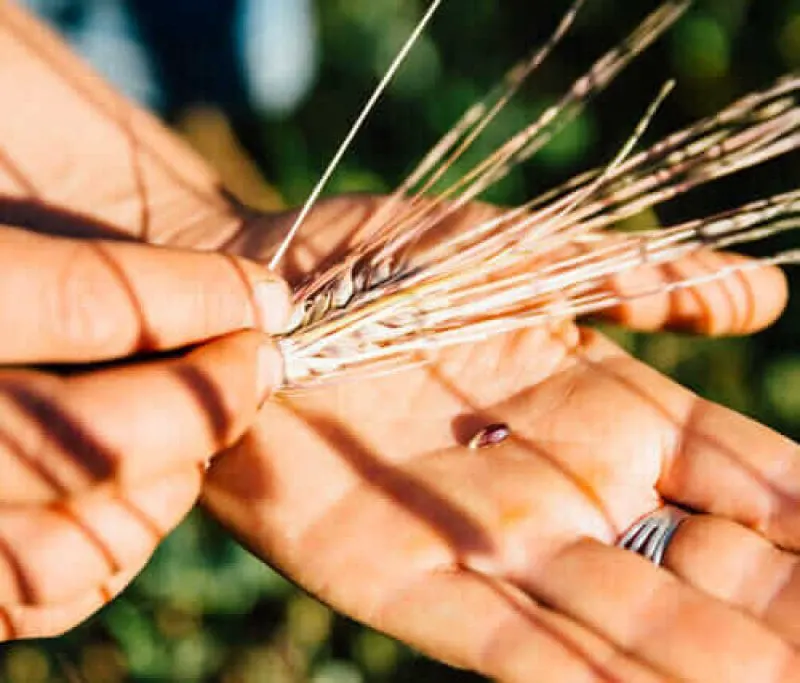Climate-resilient desert crops: New generation of hardy seeds optimized for harsh environments
Climate-resilient desert crops: New generation of hardy seeds optimized for harsh environments


While thirsty crops like alfalfa and corn dominate the region, [farmer Laura] Parker has emerged as a leader in revitalizing a wide variety of crops that grow well in arid ecosystems. She uses real-time growing conditions to develop drought-hardy vegetable, grain, and legume varieties that farmers across the Southwest can grow in the conditions created by the changing climate. Currently, she has 133 varieties of vegetables and grains available, with about 50 more in development.
Though Parker flood-irrigates her production fields, she strategically stretches the time between waterings to look for plants that are more drought tolerant than others. Then she saves their seeds.
“With some of the crops, I’ll try to irrigate every 15 days, which is really stretching the level of what they can handle,” Parker says. “There are different benefits in intentionally restricting water. In certain crops, I’m seeing a different root morphology, and that’s one of the things that I’m most excited about.”
Parker explains that a big piece of developing drought tolerance is breeding and selecting for plants with stronger taproots that can dig deep into the soil to find water. Plants with a taproot tend to do better in drier soil conditions, creating more resilience and self-sufficiency.
This is an excerpt. Read the original post here.

 | Videos | More... |

Video: Nuclear energy will destroy us? Global warming is an existential threat? Chemicals are massacring bees? Donate to the Green Industrial Complex!
 | Bees & Pollinators | More... |

GLP podcast: Science journalism is a mess. Here’s how to fix it

Mosquito massacre: Can we safely tackle malaria with a CRISPR gene drive?

Are we facing an ‘Insect Apocalypse’ caused by ‘intensive, industrial’ farming and agricultural chemicals? The media say yes; Science says ‘no’
 | Infographics | More... |

Infographic: Global regulatory and health research agencies on whether glyphosate causes cancer
 | GMO FAQs | More... |

Why is there controversy over GMO foods but not GMO drugs?

How are GMOs labeled around the world?

How does genetic engineering differ from conventional breeding?
 | GLP Profiles | More... |

Alex Jones: Right-wing conspiracy theorist stokes fear of GMOs, pesticides to sell ‘health supplements’




 Viewpoint — Fact checking MAHA mythmakers: How wellness influencers and RFK, Jr. undermine American science and health
Viewpoint — Fact checking MAHA mythmakers: How wellness influencers and RFK, Jr. undermine American science and health Viewpoint: Video — Big Solar is gobbling up productive agricultural land and hurting farmers yet providing little energy or sustainabilty gains
Viewpoint: Video — Big Solar is gobbling up productive agricultural land and hurting farmers yet providing little energy or sustainabilty gains Trust issues: What happens when therapists use ChatGPT?
Trust issues: What happens when therapists use ChatGPT? Fighting deforestation with CO2: Biotechnology breakthrough creates sustainable palm oil alternative for cosmetics
Fighting deforestation with CO2: Biotechnology breakthrough creates sustainable palm oil alternative for cosmetics California, Washington, Oregon forge immunization alliance to safeguard vaccine access against federal undermining
California, Washington, Oregon forge immunization alliance to safeguard vaccine access against federal undermining 30-year-old tomato line shows genetic resistance to devastating virus
30-year-old tomato line shows genetic resistance to devastating virus The free-range chicken dilemma: Better for birds, but with substantial costs
The free-range chicken dilemma: Better for birds, but with substantial costs ‘You have to treat the brain first’: Rethinking chronic pain with Sanjay Gupta
‘You have to treat the brain first’: Rethinking chronic pain with Sanjay Gupta
